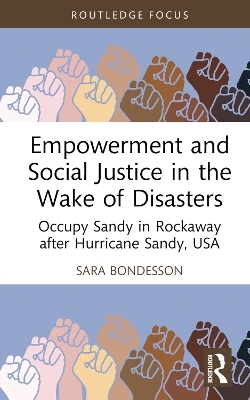
Empowerment and Social Justice in the Wake of Disasters
Routledge (Verlag)
978-0-367-43719-0 (ISBN)
This book taps into discussions about social vulnerability, empowerment, and resistance in relation to disaster relief and recovery. It disentangles tensions and dilemmas within post-disaster empowerment, through a rich ethnographic narrative of the work of Occupy Sandy in Rockaway, New York City, after Hurricane Sandy in 2012. It details both a remarkable collaborative relief phase, in which marginalized communities were empowered to take active part, as well as a phase of conflict and resistance that came about as relief turned to long-term recovery.
This volume particularly aims to understand how community empowerment processes can breach pre-disaster marginalization in the aftermath of disasters. It connects with broader emancipatory literature on dilemmas involved in empowerment ‘from the outside’. In a future of potentially harsher climate related disasters and increased social vulnerability for certain communities, this book contributes to a full and nuanced understanding of community empowerment and vulnerability reduction.
This book will be of interest to sociologists, anthropologists, geographers, political scientists, and urban studies researchers, as well as undergraduate and postgraduate students interested in disaster management, disaster risk reduction, social vulnerability, community empowerment, development studies, local studies, social work, community-based work, and emancipatory theory.
Sara Bondesson, Associate Professor at the Swedish Defence University, is a political scientist interested in disasters, identity and power. Sara combines theorizing with ethnographic methods, since she believes normative, emancipatory and transformative theories are best explored from the ground up. Apart from the Swedish National Defence University, she is also affiliated with the Centre of Natural Hazards and Disaster Science (CNDS). In teaching future political scientists and crisis managers she works with participatory and scenario-based methodologies and usually mix it up with story-telling or improvisational methods.
1. Shaking Things Loose. 2. Most Affected Least Heard. 3. Ain't no Power like the Power of the People. 4. Tales of a Peninsula Shattered and Divided. 5. Paths of Empowerment in Disaster Relief. 6. Paths of Post-Disaster (Dis-) Empowerment. 7. Saviors Trapped in Disaster (Dis-) Empowerment.
| Erscheinungsdatum | 17.08.2022 |
|---|---|
| Reihe/Serie | Routledge Studies in Hazards, Disaster Risk and Climate Change |
| Verlagsort | London |
| Sprache | englisch |
| Maße | 138 x 216 mm |
| Gewicht | 244 g |
| Themenwelt | Naturwissenschaften ► Biologie ► Ökologie / Naturschutz |
| Technik ► Umwelttechnik / Biotechnologie | |
| ISBN-10 | 0-367-43719-8 / 0367437198 |
| ISBN-13 | 978-0-367-43719-0 / 9780367437190 |
| Zustand | Neuware |
| Informationen gemäß Produktsicherheitsverordnung (GPSR) | |
| Haben Sie eine Frage zum Produkt? |
aus dem Bereich


